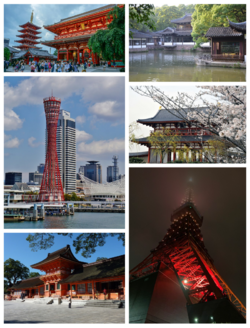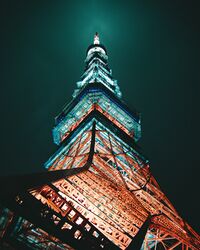Maimedo: Difference between revisions
No edit summary |
No edit summary |
||
| Line 133: | Line 133: | ||
}} | }} | ||
Maimedo (maɪmɛdəʊ; Esonian: 橙水, maimɛdɔ), also semi-officially known as Maikyo (maɪkiəʊ; Esonian: 橙京, maikʲoː), officially the Capital City of Maimedo is the national capital and largest city in Esonice with an estimated population of 992,351. The metropolitan area which includes an estimated population of 3,129,121 brings the greater city’s metropolitan population to 4,121,472 inhabitants. For nearly a millennia since the 12th century, Maimedo was and continues to be Esonice’s beating political and cultural heart. It’s a centre of traditional and modern Esonian fashion, cuisine, literature and art. It’s also an important centre of finance and commerce in the nation. Because of its many orange | Maimedo (maɪmɛdəʊ; [[Esonian language|Esonian]]: 橙水, maimɛdɔ), also semi-officially known as Maikyo (maɪkiəʊ; [[Esonian language|Esonian]]: 橙京, maikʲoː), officially the Capital City of Maimedo is the {{wp|capital city|national capital}} and largest city in [[Esonice|Esonice]] with an estimated population of 992,351. The {{wp|metropolitan area|metropolitan area}} which includes an estimated population of 3,129,121 brings the greater city’s metropolitan population to 4,121,472 inhabitants. For nearly a millennia since the 12th century, Maimedo was and continues to be Esonice’s beating political and cultural heart. It’s a centre of traditional and modern Esonian [[Culture of Esonice|fashion]], [[Maimedo#cuisine|cuisine]], [[Maimedo#literature|literature]] and [[Maimedo#art and galleries|art]]. It’s also an important centre of {{wp|finance|finance}} and commerce in the nation. Because of its many orange {{wp|terracotta|terracotta}} and {{wp|clay|clay}} tile ladenned roofs including copper coloured {{wp|limestone|limestone}} buildings, Maimedo became known in Esonian poetic literature as the “Orange City”, hence its nickname. | ||
Maimedo is tied with [[Marusonya|Marusonya]] on the {{wp|standard of living|highest standard of living}} in [[Esonice|Esonice]], however it's beaten by Marusonya in {{wp|quality of life|quality of life}}, coming in second though still closely behind. | Maimedo is tied with [[Marusonya|Marusonya]] on the {{wp|standard of living|highest standard of living}} in [[Esonice|Esonice]], however it's beaten by Marusonya in {{wp|quality of life|quality of life}}, coming in second though still closely behind. | ||
| Line 193: | Line 193: | ||
===Liturature=== | ===Liturature=== | ||
====Local folklore==== | |||
===Art and galleries=== | ===Art and galleries=== | ||
Revision as of 18:44, 30 March 2023
This article is incomplete because it is pending further input from participants, or it is a work-in-progress by one author. Please comment on this article's talk page to share your input, comments and questions. Note: To contribute to this article, you may need to seek help from the author(s) of this page. |
Maimedo
橙水 | |
|---|---|
| City of Maimedo | |
 Clockwise from top:
| |
| Nickname(s): Maikyo, Maishi, Orange City | |
| Country | |
| Province | Kinkai-koku |
| County | Maimedo-gun |
| Municipal | Maimedo-wu |
| Local | Wards of Maimedo |
| Government | |
| • Body | City Government of Maimedo |
| Area | |
| • Capital | 736.4 km2 km2 (284.32 sq mi) |
| Population (2022) | |
| • Capital | 992,351 |
| • Rank | 1st in Esonice |
| • Density | 1,300/km2 (3,500/sq mi) |
| • Metro | 3,129,121 |
| • Total | 4,121,472 |
| Demonym | Maimedoite |
| Time zone | UTC-8 |
| Post Code | ES-132 |
| Flower | Silky wisteria |
| Food | Sushi donut |
| Tree | Bellflower cherry |
Maimedo (maɪmɛdəʊ; Esonian: 橙水, maimɛdɔ), also semi-officially known as Maikyo (maɪkiəʊ; Esonian: 橙京, maikʲoː), officially the Capital City of Maimedo is the national capital and largest city in Esonice with an estimated population of 992,351. The metropolitan area which includes an estimated population of 3,129,121 brings the greater city’s metropolitan population to 4,121,472 inhabitants. For nearly a millennia since the 12th century, Maimedo was and continues to be Esonice’s beating political and cultural heart. It’s a centre of traditional and modern Esonian fashion, cuisine, literature and art. It’s also an important centre of finance and commerce in the nation. Because of its many orange terracotta and clay tile ladenned roofs including copper coloured limestone buildings, Maimedo became known in Esonian poetic literature as the “Orange City”, hence its nickname.
Maimedo is tied with Marusonya on the highest standard of living in Esonice, however it's beaten by Marusonya in quality of life, coming in second though still closely behind.
Etymology
History
Origins
12th and 19th centuries
Decay and destruction
Contemporary period
Geography
Government
Wards
Cityscape
Urbanism and architecture
Green spaces
Transport
Trams
Economy
Tourism
Education
Culture
Architecture
Liturature
Local folklore
Art and galleries
Local festivals
Cuisine
Sport
Demographics
Religion
Maimedo has 21 Buddhist temples and 127 Shinshi shrines
International relations
WIP
Twin towns - sister cities - partnerships
WIP






